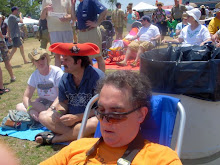Double Jeopardy: The Power Behind Jury Nullification
I have, for years, heard complaints that jury nullification is not protected by the United States Constitution, because it is not explicitly mentioned in that document. These objections not just wrong, but plainly so. I wish to respond to them briefly here.
HISTORY
First, we must look at the understanding of the jury at the time the Constitution was written. As I've discussed at length elsewhere, the Founding generation considered the role of the criminal trial jury to include discussing both law and fact. This wasn't controversial at the time of the founding. Jefferson, Franklin, Hamilton and many others supported this view.
Secondly, legal practice in the early years of this country was to instruct jurors on their role as finders of both law and fact - even in civil cases. The plainest example is in Georgia v. Brailsford, 3 U.S. 1 (1794), in which John Jay, for a unanimous Supreme Court, wrote:
"It may not be amiss, here, Gentlemen, to remind you of the good old rule, that on questions of fact, it is the province of the jury, on questions of law, it is the province of the court to decide. But it must be observed that by the same law, which recognizes this reasonable distribution of jurisdiction, you have nevertheless a right to take upon yourselves to judge of both, and to determine the law as well as the fact in controversy. On this, and on every other occasion, however, we have no doubt, you will pay that respect, which is due to the opinion of the court: For, as on the one hand, it is presumed, that juries are the best judges of facts; it is, on the other hand, presumbable, that the court are the best judges of the law. But still both objects are lawfully, within your power of decision. "
Finally, let's look at the best understanding we can have as to what a jury was expected to BE at the time of the founding: the most popular law dictionary of the time. Jacob's Law Dictionary explicitly stated that a criminal petit (trial) jury's role was was to decide both questions of fact and law. Pretty straight-forward as to what informed people would have considered the role of the jury.
Clearly, a historical understanding of the role of the jury indicates that it was never intended to be a mere fact-finder.
WHAT DOES THE CONSTITUTION SAY?
Several clauses of the Constitution and Bill of Rights protect the jury's prerogative to deliver a verdict according to conscience. The Art. III, Sec. 2 and Sixth Amendment guarantees to trial by jury deprive the trial court of the ability to convict a defendant against the wishes of the jury. There can be no directed verdicts for the prosecution in criminal cases - even if the defendant takes the stand and admits to every element of the offense.
A defendant cannot be denied a trial by jury in any case in which the sentence is more than six months. The jury can acquit, whatever the evidence, because only they can make the decision - and no matter what the reason for their acquittal is, it stands.
But most importantly, the Double Jeopardy Clause of the Fifth Amendment prevents the Government from re-prosecuting anyone who has been acquitted by a jury -- no matter how irrational, arbitrary, or bizarre the jury's reasoning in finding the accused not guilty. Even if the jury foreman scribbles the words "because your law sucks" under the words "not guilty" - and the inscription is unanimously initialed by the jurors. Not guilty = over (at least so far as that sovereign is concerned).
Consider the situation in Russia, in which jury acquittals are nothing more than speed bumps for prosecutors. Clearly, the power of Russian jurors to nullify is non-existent. Even when Vera Zasulich was acquitted for shooting the Governor General of St. Petersburg, she would have been re-prosecuted had she not gotten out of the city before she could be re-arrested.
Such has never been the case in America. While a person acquitted in State court can still be prosecuted and convicted in Federal court (remember the trials of the L.A. police officers caught on videotape beating Rodney King), it rarely occurs. The Double Jeopardy clause of the Fifth Amendment is still alive and well. As the Pennsylvania Superior Court has noted, the Double Jeopardy interest in protecting jury nullification is "absolute," as nullification is "the highest interest protected by the principle of double jeopardy."
CONCLUSION
It is clear that at the time the Constitution was written, it was intended to protect the nullification prerogative, as the definition of the jury trial at the time included that option. It would be like guaranteeing people cars, and then saying "ah, we never mentioned anything about tires or engines." Without tires or engines, we may have a collection of automotive parts, but we do not have cars. Similarly, without the nullification prerogative intact, we may have maintained significant vestiges of the Founders' trial by jury - but we certainly don't have the whole thing.
The Constitutional right to a jury empowered to nullify is protected in the Constitution. What is not guaranteed in the Constitution (although it may perhaps be considered included under the rubric of procedural due process) is the right of a defendant to inform the jury as to its nullification prerogative. However, there is no room for reasonable doubt as to the jury possessing this prerogative under our Constitution. It is there - and it's not going away.

